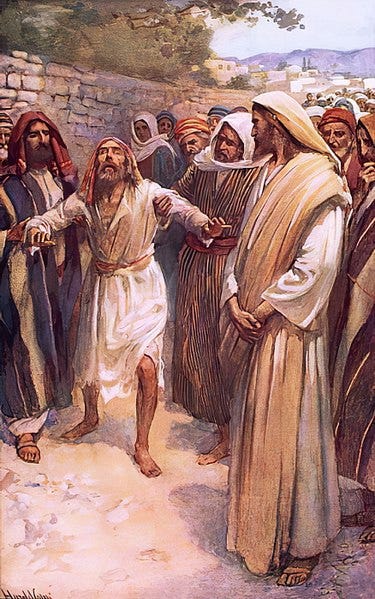Master, I Want to See
Homily for Sunday, October 27, 2024; Thirtieth Sunday of Ordinary Time
I’ve been sick this weekend and never got the chance to preach this homily. So it has none of the fine-tuning, the embellishments, the changes that come from delivering it four times to our local congregations. But anyway, here’s what I wrote.
One way to approach a Gospel reading is to reflect on the different characters, the different personalities in the story, and to ask ourselves, Who am I in this scenario?
The first and most obvious character here is Jesus. We’d all love to be more like Jesus – that’s the whole point, isn’t it? But at the same time we have to understand that we’re not there yet. We have a ways to go before we reach that point.
No, we have to face the fact that while we aspire to be more like Jesus, we’re going to be starting off more like the other people in the Gospel story. So who are we? And how do we get from there to Jesus?
The other major character is Bartimaeus, the blind beggar.
Bartimaeus is the typical outcast. He is afflicted with a disability that makes it harder for him to participate in society without some kind of help or accommodation, living in a culture and a society that doesn’t necessarily see the use in being helpful or accommodating. Bartimaeus is left to fend for himself, begging at the side of the road.
It does tend to be the way of the World, that any given society works best for those it works best for. That is to say, human societies tend to look first after the needs of those who are most able to look after their own needs. Jesus told us that the poor will always be with us, because he recognized that the rich will always look after themselves.
This is why, as Jeremiah reminds us in the first reading, The Lord will always look first and foremost after those left on the sidelines. The blind and the lame, mothers and those with child, those who depart in tears, anyone whom society fails to make accommodation for, the Lord will gather to Himself.
Rounding out our cast of characters in the Gospel, we have the crowds surrounding Jesus. And we see these crowds fall into two different camps: those who try to silence Bartimaeus, and those who encourage him.
Because Bartimaeus is not one to sit quietly and wait on the kindness of strangers. We get the impression here of a strong self-advocate. We see him calling out to Jesus for help. We see that as people try to silence him, he only calls out the louder; Jesus, Son of David, have pity on me!
It’s an interesting side-note, I think, that this is the first time in Mark’s Gospel that Jesus is addressed by a Messianic title. This blind beggar, Mark tells us, is the first to recognize Jesus for who He truly is.
Meanwhile, we are told that the crowds rebuked him and told him to be silent. But when Jesus asks for him, the crowd is more positive. Take courage! Get up! He’s calling you!
I can’t help but wonder how much overlap there is in these two groups. How many in the crowd began by trying to silence him, but when Jesus took notice they changed their tune?
That’s not necessarily a bad thing, to change your mind because Jesus said so. Those people are likely better off than those who keep trying to silence Bartimaeus even as Jesus is calling him.
And maybe too there are those in the crowd who don’t speak up at all until Jesus does. Maybe they keep out of it while others try to silence him, but Jesus’s words give them the courage to speak up.
This is where we can start to ask ourselves: Who am I in this Gospel story?
We live in a very diverse society. So many races, religions, creeds, cultures, ideologies, and social standings, all lumped together into one big melting pot. And it seems as though everyone has their own stories, their own complaints, about how the society we live in leaves them by the sidelines, how it fails to look after their needs.
And our tendency in that case is to focus on our own problems and complaints and difficulties and try to disregard everyone else’s. We seek out like-minded people to commiserate with and wall ourselves off from the rest.
Even if we’re not trying to actively silence Bartimaeus, we might be trying our best to ignore his cries.
So it’s worth taking a moment to look around – around our church, our community, our daily lives – to ask ourselves, who is being ignored or discounted? Who is being left on the side of the road?
Because God is gathering them all from the ends of the earth. Jesus is calling to them, reaching out to them, asking, What do you want me to do for you? Asking each of us.
Like Bartimaeus, we can answer, Master, I want to see! We can ask Jesus to open our eyes to anyone else out there looking for his mercy, his healing, his grace. People we ourselves can reach out to and say, take courage! Jesus is calling you.


